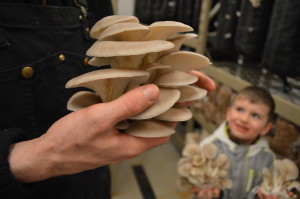
Braydon Mills helps his dad harvest oyster mushrooms at Mushroom Mills in rural Columbus Junction, Iowa. (photo/Cindy Hadish)
By Cindy Hadish/for Radish Magazine
COLUMBUS JUNCTION – Todd Mills is growing the future.
The lion’s mane and oyster mushrooms Mills cultivates in a growing room outside his rural Columbus Junction home possess a distinctively futuristic look, while also holding promise in studies of their health benefits.
Mills, 31, has been selling mushrooms the past few years at the Iowa City Farmers Market and more recently at the Downtown Farmers Market in Cedar Rapids. This year, he became a supplier for New Pioneer Food Co-op, under his business name, Mushroom Mills.

Lion’s mane and oyster mushrooms from Mushroom Mills are among the mushrooms for sale (at left) in the produce aisle of New Pioneer Food Co-op in Iowa City. (photo/Cindy Hadish)
Clear plastic containers of the off-white, shaggy lion’s mane and more sculpted oyster mushrooms are sold in both the Coralville and Iowa City New Pioneer locations.
Produce Coordinator Mike Krogh said the two stores are carrying more varieties of mushrooms than ever before “and customers are buying them.”
New Pi, which will open a store in Cedar Rapids and plans a new site in Iowa City, routinely carries 10 varieties of fresh mushrooms and eight to 10 types of dried mushrooms, he noted.
While sales of mushrooms have not increased substantially over last year, Krogh said customers seem pleased with the variety.
“There has definitely been a positive response to the increased selection in our stores,” he said.
That response isn’t lost on Mills, who is keeping up with demand.
“I want to make sure the co-op is supplied with as much as they need,” he said.
Mills didn’t initially set out to be a mushroom grower. His day job keeps him busy as a lubrication analyst in Cedar Rapids with the Allied Reliability Group, which specializes in equipment maintenance.
“Everyone hunts morel mushrooms and I was no different,” he said of his fungi beginnings. After researching the possibility of growing mushrooms, Mills took a class with mycologist and author, Paul Stamets, and has been hooked ever since.
Along with selling mushrooms, he also has sold mushroom grow-kits at farmers markets.

Braydon runs outside next to the family’s mushroom growing operation in rural Columbus Junction. (photo/Cindy Hadish)
Last year, he decided to uproot his family from their Cedar Rapids home to a more spacious site in rural Louisa County. The southeast Iowa acreage offered space to build his mushroom growing room, needed to increase the output.
As of early spring, Mushroom Mills was growing between 20 and 25 pounds of mushrooms per week. To be financially viable, Mills estimates he needs to grow about 100 pounds per week, which is feasible in his new space.
The structure was built specifically to grow mushrooms. Humidity is kept intentionally high inside the building, where shelves are lined with bags filled with growing medium for the lion’s mane and oyster mushrooms.
Mushroom spawn is inoculated on straw that has been pasteurized in 55-gallon drums outside, with super-fine sawdust, oats and wood chips also used in the growing process.
Spaceship-shaped oyster mushrooms grow on one side of the room, with the tufted hedgehog-like lion’s mane on the other.
Mills said the two mushroom varieties are compatible, but introducing other types could require a separate space.
The operation is surprisingly sterile, which Mills notes is necessary to prevent introducing the wrong type of spores from growing.
“You want to maintain the purity of your cultures,” he said.
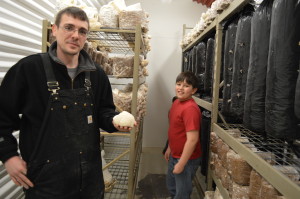
Todd Mills holds a lion’s mane mushroom as his son Ethan looks on in the growing room of their mushroom operation in Columbus Junction. (photo/Cindy Hadish)
Both the lion’s mane and oyster mushrooms take three to four weeks to grow. The mushrooms protrude from the plastic grow-bags until they are the right size to harvest. Mills’ two sons, Ethan, 10, and Braydon, 5, sometimes help their dad by carefully picking the mushrooms they can reach.
Websites that tout the benefits of the exotic-looking lion’s mane, which tastes a bit like lobster when sauteed in butter, often note that the mushrooms are difficult to find in stores.
Mills believes it’s only a matter of time before people discover his mushrooms in Eastern Iowa and to recognize the reputed health benefits of mushrooms in general.
“The medicinal side is really starting to bloom,” he said. “Once the mainstream catches on, it should be a huge market.”
Mushrooms have been used for centuries in Asia, but Western medicine has only recently taken notice.
Mills cited research into the benefits of oyster mushrooms in cancer studies, while lion’s mane is being studied for its potential uses for patients with Alzheimer’s disease and nerve regeneration.
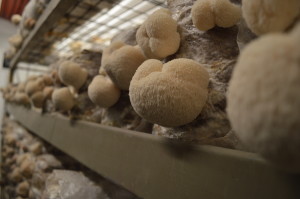
Lion’s mane mushrooms grow inside the Mushroom Mills grow room in rural Columbus Junction. Grower Todd Mills sells the mushrooms at farmers markets and food co-ops. (photo/Cindy Hadish)
Other benefits attributed to mushrooms include reducing anxiety, improving the immune system and acting as antioxidants.
Mills has forayed into the restaurant world, as well, with Mushroom Mills’ oyster mushrooms used at the Bluebird Diner in Iowa City.
“We try to incorporate them where we can,” Bluebird co-owner Jon Wilson said, citing the mushrooms being batter-dipped and used in specials. “We’ve tried them in just about everything.”
The “Local Yokel” omelet, for example, uses all-local cheeses and other ingredients, including mushrooms.
Wilson said the diner makes a point of sourcing as much locally as possible and customers appreciate knowing their food comes from small, local growers.
Both oyster mushrooms and lion’s mane – also known as monkey’s head, pompom and bear’s head – grow in the wild, generally on dead or dying tree trunks, but mushrooms are still a rare commodity to cultivate in Iowa.
State horticulturist Mike Bevins, of the Iowa Department of Agriculture and Land Stewardship, said Iowa doesn’t track the number of mushroom growers in the state, but may include them in its 2015 survey of food producers.
Vendors who sell morels need a certificate to show they’ve taken an approved workshop in identifying the spongelike mushrooms, but Bevins said cultivated mushrooms fall under the purview of the Iowa Department of Inspections & Appeals. The department does not inspect sites that grow raw agricultural products, including mushrooms, unless food processing is involved, such as slicing or bottling the product.
Anecdotally, Bevins has heard of several Iowa businesses that cultivate mushrooms, “but if I had to guess, there’s only about a half-dozen mushroom growers in the state,” he said.
Mills is looking into selling his mushrooms in other venues and hopes to eventually make Mushroom Mills his full-time job. Just this month, he began selling the mushrooms through the Iowa Valley Food Co-op.
“This year should be our big year,” he said. “I’m looking forward to it.”
Find other stories about healthy living at the Radish Magazine and see more photos from Mushroom Mills below: (photos (c) Cindy Hadish/Homegrown Iowan and the Radish Magazine)
CLARIFICATION: The original version of this article mentioned Todd Mills’ wife. The two are not married.
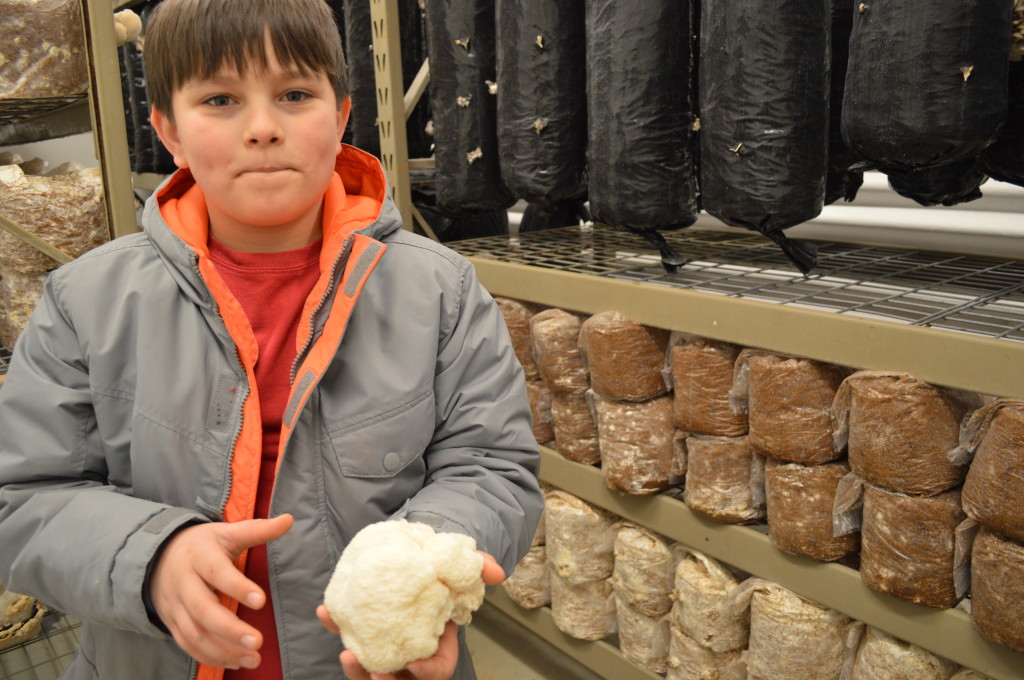
Ethan Mills displays a lion’s mane mushroom he harvested at the family’s mushroom operation in Columbus Junction, Iowa. (photo/Cindy Hadish)
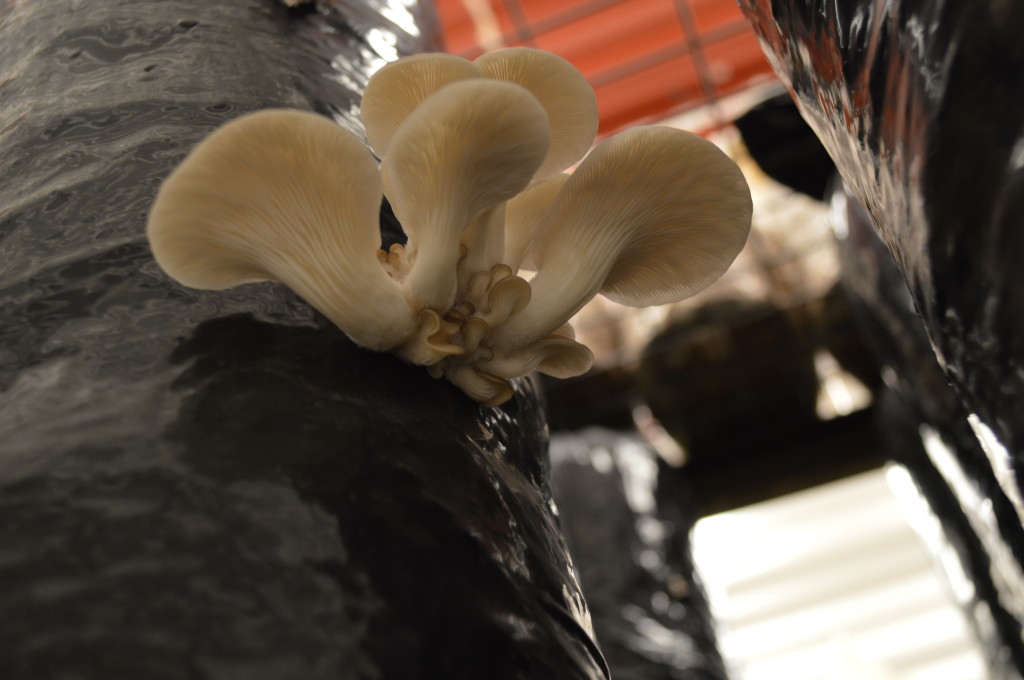
Oyster mushrooms grow on one side of the room, with lion’s mane on the other side. (photo/Cindy Hadish)
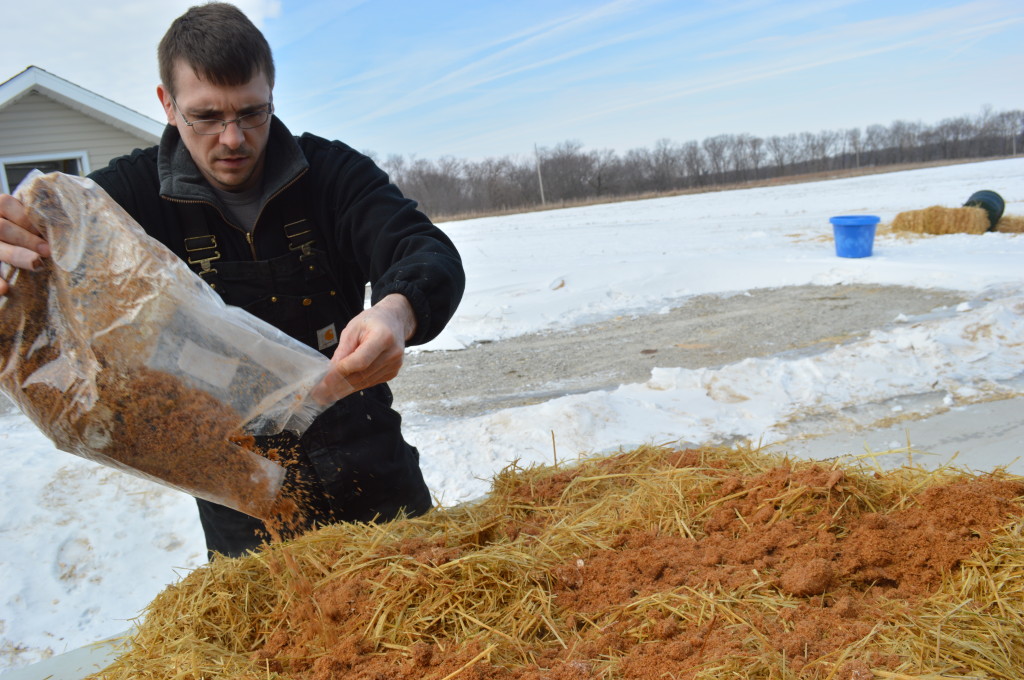
Todd Mills prepares the growing medium for the mushrooms outside his rural Columbus Junction home. Mushroom spawn is inoculated on straw that has been pasteurized in 55-gallon drums outside, with super-fine sawdust, oats and wood chips also used in the growing process. (photo/Cindy Hadish)
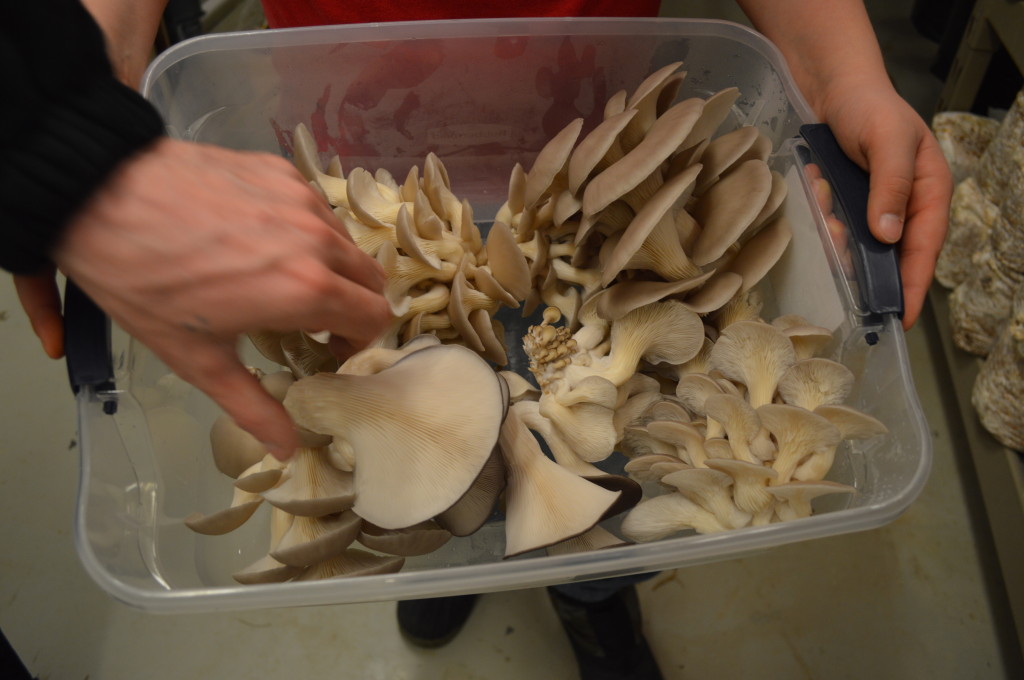
Oyster mushrooms that have been harvested from the grow room are carefully placed in containers. Both lion’s mane and oyster mushrooms are sold at farmers markets and food co-ops. (photo/Cindy Hadish)

I have been growing oysters and Lions mane my self for around six months and am really looking to start to sell Bulk as you are around 50 lbs or more a week. I have been trying to find out if I need to be certified to sell my product to outlets but have been able to find nothing surprisingly, A bump in the right direction would be much appreciated. Live in Southern Iowa. Trying to get organic certification. If I do need to be certified please offer a number which I may contact about this.
Thanks
Jay,
I can’t give you advice, but this was in the article: State horticulturist Mike Bevins, of the Iowa Department of Agriculture and Land Stewardship, said Iowa doesn’t track the number of mushroom growers in the state, but may include them in its 2015 survey of food producers. Vendors who sell morels need a certificate to show they’ve taken an approved workshop in identifying the spongelike mushrooms, but Bevins said cultivated mushrooms fall under the purview of the Iowa Department of Inspections & Appeals. The department does not inspect sites that grow raw agricultural products, including mushrooms, unless food processing is involved, such as slicing or bottling the product.
If you need to reach them, the Iowa Department of Inspections and Appeals is at (515) 281-7102.
Hope this helps!
Would an indoor grower be interested in looking at my building (10,000 sq. feet) in Grant Iowa, near Atlantic Iowa, looking at feasibility to growing mushrooms indoor year around. Thanks for your reply!!
Hi Jim,
Are you looking for someone to rent your building or are you hoping to grow mushrooms yourself?
First off I am so happy to see other cultavaters in Iowa. I am a transplant from the Pacific Northwest and have started yellow, pink , pearl oyster mushrooms in eastern Iowa, north of the quadcities. There so fun to grow the markets here in Iowa are small but has a lot of groth potenial.
I am member of the Prairie Sates Mushroom Club. In Feb. I am manning a table at the Master Gardeners Winter Fair in Cedar Rapids. I would be interested in getting a mushroom log already fruiting to adorn the table; probably a lions main and maybe an oyster.
Todd, just found you article on line. It sounds really interesting. Would love to talk to you to get you to do a program for our Journey ladies. We meet the third Wednesday of the month at 1:30. from April to November in Wapello. Can we get together to work something out?
i need some spaws or spore but everything it wood be nice too have someone close
[…] multiple warehouses for mushroom cultivation. Or small scale, such as Todd Mill’s mushroom farm, Mushroom Mills, in Columbus Junction, Iowa. Mill’s farm started off by growing mushrooms in an environmentally […]
[…] multiple warehouses for mushroom cultivation. Or small scale, such as Todd Mill’s mushroom farm, Mushroom Mills, in Columbus Junction, Iowa. Mill’s farm started off by growing mushrooms in an environmentally […]